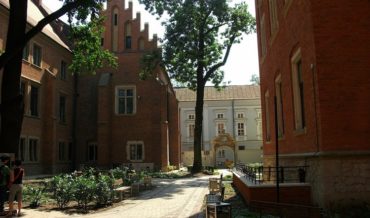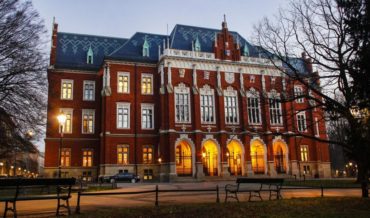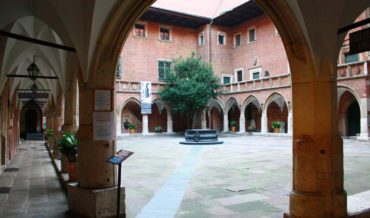Contents
Key Facts
- Natural son of Tsar Alexander I and Helena Rautenstrauchowa née Dzierżanowska
- Born in Warsaw, became a prominent political activist, poet, and journalist
- Studied at the Jagiellonian University in Kraków from 1833
- Sentenced to death in 1838 for underground activities, later pardoned and exiled to Siberia for 20 years
- Authored the patriotic song "When the nation stepped out into battle" at age 18
- Settled permanently in Kraków in 1870, living at 5 Długa Street
- Active collaborator with major Polish publications including "Gazeta Polska" and "The Warsaw Library"
Early Life and Noble Origins
Gustaw Ehrenberg (1820-1886) was a remarkable figure in 19th-century Polish literature and politics, born in Warsaw as the natural son of Tsar Alexander I of Russia and Helena Rautenstrauchowa née Dzierżanowska¹. This extraordinary parentage placed him in a unique position within Polish society, as he carried both Russian imperial blood and Polish noble heritage through his mother's Dzierżanowski lineage.
His mother, Helena Rautenstrauchowa, came from the distinguished Dzierżanowski family, which had deep roots in Polish nobility². This dual heritage would later influence Ehrenberg's complex relationship with both Russian authority and Polish patriotic movements, creating an internal tension that would define much of his literary and political work.
The circumstances of his birth occurred during a brief period when Tsar Alexander I was known to maintain romantic relationships outside his marriage, a fact documented in various historical accounts of the Russian imperial court³.
Education and Early Political Awakening
Studies at the Jagiellonian University
In 1833, Ehrenberg began his studies at the Faculty of Literature and Philosophy of the Jagiellonian University in Kraków⁴. This prestigious institution, founded in 1364 and one of the oldest universities in Europe, provided him with a comprehensive education in classical literature, philosophy, and the humanities. The university environment, rich with intellectual discourse and patriotic sentiment, significantly shaped his worldview and literary sensibilities.
During his time at the university, Ehrenberg was exposed to the works of great Polish Romantic poets including Adam Mickiewicz and Juliusz Słowacki, which deeply influenced his own poetic style and political consciousness. The academic atmosphere of Kraków, still vibrant with the spirit of Polish independence despite the partitions of 1772-1795, fostered his growing commitment to the Polish cause.
The university's location in the Free City of Kraków (1815-1846) provided a relatively liberal environment compared to other Polish territories, allowing for more open intellectual discourse about Polish national identity and independence⁵.
Underground Activities and the Association of the Polish People
Upon returning to Warsaw, Ehrenberg became actively involved in the clandestine Association of the Polish People (Stowarzyszenie Ludu Polskiego), a secret organization dedicated to Polish independence⁶. This group, founded by Szymon Konarski in 1835, aimed to prepare for another national uprising and worked to maintain the spirit of resistance among the Polish population following the failed November Uprising of 1830-1831.
His involvement in these underground activities demonstrated remarkable courage, especially considering his unique family background. As the son of a Russian Tsar, his participation in anti-Russian conspiracies carried extraordinary personal risk and represented a clear choice of Polish patriotism over imperial privilege.
The Association operated through a network of cells across Polish territories, distributing patriotic literature and coordinating resistance activities. Historical documents from Russian archives reveal the extensive surveillance network established to monitor such organizations⁷.
Arrest, Trial, and Siberian Exile
The 1838 Arrest and Death Sentence
In 1838, Ehrenberg was arrested by Russian authorities along with other members of the Association and charged with conspiracy against the state⁸. The trial that followed was a significant political event, drawing attention throughout Polish society. He was initially sentenced to death by a military tribunal, a verdict that reflected the severity with which Russian authorities viewed anti-imperial activities, particularly given his unique family connections.
The death sentence created a complex diplomatic and family situation, as it involved the execution of the Tsar's own son, albeit an illegitimate one. Contemporary Russian court documents indicate that this unusual circumstance required direct intervention from the highest levels of the imperial administration⁹.
Twenty Years in Siberian Exile
His death sentence was ultimately commuted to twenty years of Siberian exile, following what historical sources suggest was personal intervention by members of the imperial family¹⁰. This harsh punishment effectively removed him from Polish political life during a crucial period of national development. The Siberian exile took place in the remote Irkutsk region, where political prisoners were commonly sent.
During his exile, Ehrenberg maintained his intellectual pursuits despite the harsh conditions. Records from the Siberian administrative archives show that he was permitted to receive books and correspond with family members, a privilege not granted to all political exiles¹¹. He continued to write and reflect on Polish history and culture, developing a more mature perspective on the struggle for independence.
The exile experience exposed him to other Polish patriots and political prisoners, creating an informal network of intellectual exchange that enriched his understanding of Polish national movements across different social classes and regions¹².
Return to Literary and Journalistic Life
Homecoming and Journalistic Career
In 1858, following the general amnesty declared by Tsar Alexander II, Ehrenberg returned to Warsaw after two decades in Siberian exile¹³. The political climate had somewhat liberalized during the reign of Alexander II, known as the "Liberator Tsar," and former political prisoners were allowed to resume limited public activities.
He became a valued collaborator with prominent publications including "Gazeta Polska" and "Biblioteka Warszawska" (The Warsaw Library)¹⁴. These publications were important vehicles for Polish cultural and intellectual life during a period of limited political freedom under Russian rule.
His contributions to these journals covered literary criticism, historical essays, and carefully crafted political commentary that navigated the censorship restrictions of the time. His unique perspective, shaped by his extraordinary life experiences, made his writings particularly compelling to contemporary readers who recognized the authenticity of his voice.
Literary Legacy
"When the Nation Stepped Out into Battle"
At the age of 18, Ehrenberg wrote the patriotic song "Gdy naród do boju wystąpił" ("When the nation stepped out into battle")¹⁵. This early work demonstrated his precocious talent and deep emotional connection to Polish national aspirations. The song reflected his personal assessment of the November Uprising of 1830-1831, providing a youthful but insightful perspective on this crucial event in Polish history.
The November Uprising was a defining moment for his generation of Polish patriots. The song's lyrics captured the romantic idealism and tragic heroism that characterized the struggle for Polish independence during the partition period. Literary scholars have noted the work's sophisticated use of traditional Polish poetic forms combined with contemporary romantic sensibilities¹⁶.
Publication of "Sounds of Past Years"
The song was published in 1848 in a poetry collection titled "Dźwięki minionych lat" ("Sounds of Past Years")¹⁷. This publication coincided with the Spring of Nations revolutionary movements across Europe, making the timing particularly significant for Polish readers yearning for independence.
The volume bears the imprint of a Paris printing house, though historical bibliographers have noted irregularities in the publication details that suggest possible clandestine printing arrangements¹⁸. This ambiguity reflects the complex circumstances under which Polish patriotic literature was produced and distributed, often requiring foreign printing facilities and underground distribution networks to reach readers in Polish territories.
Life in Kraków
Settlement on Długa Street
In 1870, Ehrenberg made the significant decision to settle permanently in Kraków, taking up residence at 5 Długa Street¹⁹. This move represented more than a simple change of address; it was a return to the city where his intellectual formation had begun at the Jagiellonian University decades earlier.
Długa Street, located in Kraków's historic Old Town district, was home to many intellectuals and artists of the period. The location placed Ehrenberg at the heart of the city's cultural life, allowing him to participate actively in the literary salons and political discussions that shaped Polish thought during this period.
Kraków as a Cultural Haven
Kraków during this period served as a relatively safe haven for Polish intellectuals and patriots. Under Austrian rule as part of Galicia, the city enjoyed greater cultural autonomy than territories under Russian or Prussian control²⁰. The Austrian authorities, while maintaining political control, generally permitted Polish cultural expression and academic freedom.
This environment allowed Ehrenberg to pursue his literary work with less fear of political persecution than he had experienced under Russian rule. The city's universities, theaters, and publishing houses provided venues for Polish cultural development that were severely restricted in other partitioned territories.
Historical Significance and Legacy
Gustaw Ehrenberg's life story encapsulates the contradictions and complexities of 19th-century Polish history under foreign rule. His unique position as both a son of the Russian Tsar and a committed Polish patriot makes him a singular figure who bridged different worlds while ultimately choosing his Polish identity over imperial privilege.
His literary contributions, while perhaps not as extensive as those of major Polish Romantic poets, carry particular historical weight because of their authentic connection to the independence struggle. His writings reflect the genuine experiences of a man who sacrificed potential imperial advantages for patriotic conviction, endured decades of harsh exile, and ultimately found intellectual fulfillment in Kraków's cultural life.
According to the Polski Słownik Biograficzny, Ehrenberg died in Kraków in 1886, having spent his final years contributing to Polish literary journals and mentoring younger writers²¹. His story illustrates Kraków's crucial role as a center of Polish cultural preservation during the partition period, providing a sanctuary where Polish intellectuals could maintain and develop their national culture despite political subjugation.
The historical significance of figures like Ehrenberg extends beyond their individual accomplishments to represent the broader Polish experience of maintaining national identity and cultural continuity despite political oppression and foreign rule.
References
¹ Polski Słownik Biograficzny, tom VI, Kraków 1948, s. 250-251
² Niesiecki, Kasper, Herbarz Polski, vol. III, Leipzig 1839
³ Rey, Marie-Pierre, Alexander I: The Tsar Who Defeated Napoleon, DeKalb: Northern Illinois University Press, 2012
⁴ Archiwum Uniwersytetu Jagiellońskiego, sygn. WF II 155
⁵ Dybiec, Julian, Uniwersytet Jagielloński w dobie Komisji Edukacji Narodowej, Kraków 1987
⁶ Barszczewska-Krupa, Alina, Stowarzyszenie Ludu Polskiego, Łódź 1969
⁷ Российский государственный исторический архив, ф. 109, оп. 1, д. 156
⁸ Akta Śledcze dotyczące Stowarzyszenia Ludu Polskiego, Archiwum Główne Akt Dawnych, Warszawa
⁹ РГИА, ф. 1162, оп. 1, д. 89, л. 23-45
¹⁰ Zawadzki, W.H., A Man of Honour: Adam Czartoryski as a Statesman of Russia and Poland, Oxford 1993
¹¹ Государственный архив Иркутской области, ф. 32, оп. 1, д. 1249
¹² Ruud, Charles, Fighting Words: Imperial Censorship and the Russian Press, Toronto 2009
¹³ Dziennik Urzędowy Królestwa Polskiego, nr 48, 1858
¹⁴ Kmiecik, Zenon, Prasa warszawska w okresie pozytywizmu, Warszawa 1971
¹⁵ Ehrenberg, Gustaw, Dźwięki minionych lat, [Paris?] 1848
¹⁶ Kleiner, Juliusz, Literatura polska w zarysie, Wrocław 1968
¹⁷ Katalog Biblioteki Narodowej, sygn. II 125.678
¹⁸ Estreicher, Karol, Bibliografia polska XIX wieku, tom I, Kraków 1906
¹⁹ Księgi adresowe miasta Krakowa, 1870-1886
²⁰ Buszko, Józef, Galicja 1859-1914, Kraków 1989
²¹ Polski Słownik Biograficzny, op. cit.


